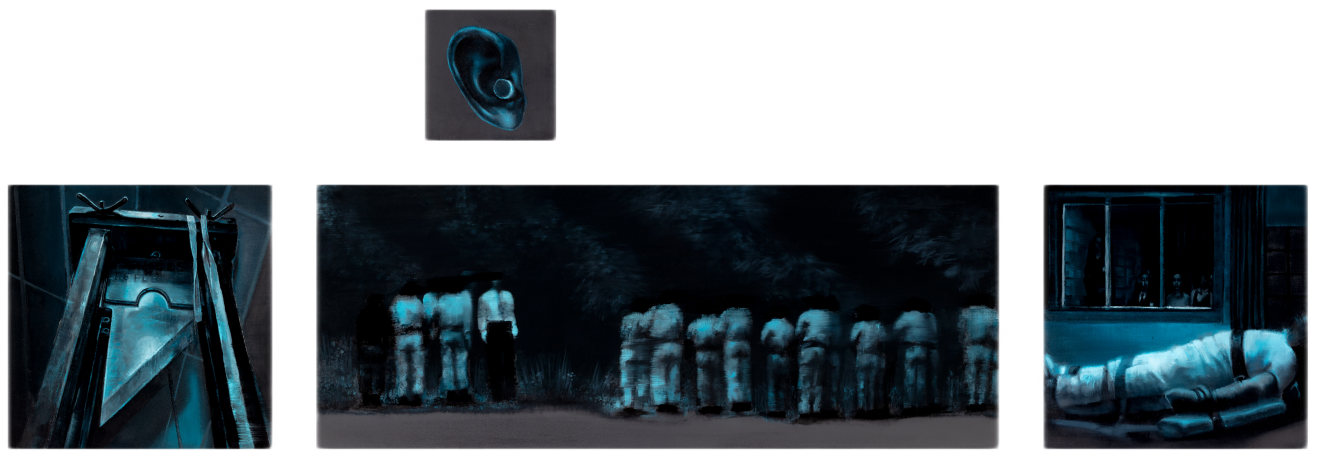Theorimata 2: On History, Temporary Exhibitions Space (-1), 1 October – 22 November 2020.
The first exhibition was presented in 2018 with the aim to become a biennial event, providing the chance to curators, critics, art history scholars, and also artists to converse, collaborate and intervene in the artistic field; the theme of “Theorimata” will be differentiated each time, focusing on the characteristics and major issues of each period.
For the exhibition Theorimata 2: On History, 25 curators, scholars and art critics, members of the Greek Section of AICA, propose 56 artists who, with History as their axis, promote the function of art as an alternative educational tool and a means of dynamically intervening in the social fabric. The idea that the knowledge of the past is an aid to the interpretation of the present and a guide to the future, asserted by Thucydides in his first book on the History of the Peloponnesian War, runs through the exhibition in which installations, constructions, sculptures, photographs, paintings, artists’ books, drawings, videos and happenings are presented.
Fotini Poulia, “Till death comes” as proposed by Artemis Kardoulaki.
"A guillotine, which was considered, in Europe, a noble way of death, the shooting of the last Greek death row inmate Vassilis Lymperis in 1972 and a bed with straps where the deadly injection is given in modern times, are depicted naked as reality, with only reversal-intervention, act of humanity, the earmuffs that Liberis requested during his execution, but were not given to him".
“Fotini Poulia chose to present in “Theorimata II” the subject of the death sentence. In this we have a massacre of Democracy – the death sentence is a legalized death. A human life is taken by a court order. The state has been sick with this since antiquity. But what makes the death sentence even more heinous is the invention of all these different killing methods, obviously inspired by sadists.
As the researched killing methods in the span of time, she came across some gruesome, horrifying human inventions. Although this practice has been abolished in most countries of the world, there are, however, several nations and states where the state's authorities have the legal right to permit the imposition of this “most extreme of penalties”.
In the last unit of her work, entitled “No Land” and consisting of paintings and sketches, she explores the current state of affairs, illustrating the sense of desolation of a land, its failures and unfitness. Wars and their impact, the dislocation of people, images of destroyed cities, lands hastily released from human existence; real, symbolic and mental landscapes reminding us of the clinical dimension of political decisions on human life, but also of the results of the violent, callous and destructive intervention of human on nature.
Idiosyncratically she finds it extremely difficult, perhaps exhibiting naiveness, to come to terms with the notion that man as a being may be overcome so much with the power of the oppressor, of the Superman, the one who will decide the life or death of millions of people, animals and an entire planet.
Since politics underlines her work, the artist believes that her relationship with art always facilitates her with the opportunity to articulate a political statement, to broach, bring to prominence, interpret and, ultimately, perhaps even shape a different view, as a comment to each event.
Works of art and modern creators can become a form of practical resistance against a systemically oppressive political system scorning and rejecting the fight for human existence not defined by economic and technological systems. Modern art must gall all those who are satisfied with superficial explanations, modern art must question technocratic conditions and capitalism.”
The exhibition will be accompanied by a bilingual catalogue (in Greek and English) with introductory texts by Bia Papadopoulou and Emmanuel Mavrommatis, texts by the curators, photographs of the works and biographies of both the curators and artists.
The participating curators and artists are the following: Alexandros M. Pfaff as proposed by Maria A. Angeli.
Vicky Tsalamata, Antonis Choudalakis as proposed by Dionissia Giakoumi.
Marina Gioti, Aristeidis Lappas, Thanasis Chondros – Alexandra Katsiani as proposed by Sozita Goudouna.
Klitsa Antoniou, Yioula Hatzigeorgiou as proposed by Antonis Danos.
Anastasis Stratakis as proposed by Charis Kanellopoulou.
Yorgos Lazongas, Fotini Poulia, Angelos Skourtis as proposed by Artemis Kardoulaki.
Marios Spiliopoulos, Tassos Triandafyllou, Ersi Hatziargyrou as proposed by Vassia Karkayanni-Karabelias.
Annita Argyroiliopoulou, Irini Diadou as proposed by Lena Kokkini.
Maria Andromachi Chatzinikolaou as proposed by Magda Koubarelou.
Mary Christea as proposed by Tassos Koutsouris.
Filippos Vasileiou as proposed by Christoforos Marinos.
Ersi Venetsanou, Costas Vrouvas, Evi Kirmakidou as proposed by Emmanuel Mavrommatis.
Nikos Giavropoulos, Costis as proposed by Konstantinos Basios.
Georgia Kotretsos & Panos Tsagaris as proposed by Maria Nicolacopoulou.
Eleni Lyra, Efsevia Mihailidou, Dimitris Skourogiannis as proposed by Stratis Pantazis.
Eleni Τzirtzilaki, Giorgos Tserionis, George Harvalias as proposed by Bia Papadopoulou.
Dimitris Alithinos, Angelos Antonopoulos, Yiorgos Tsakiris as proposed by Miltiadis Μ. Papanikolaou
Dimitris Zouroudis, Kyrillos Sarris as proposed by Niki Papaspirou.
Alexandros Georgiou, Pelagia Kyriazi as proposed by Spyros Petritakis.
Georgia Sagri, Eliza Soroga, Filippos Tsitsopoulos as proposed by Constantinos V. Proimos.
Takis Zerdevas, Constantinos Massos, Efi Fouriki as proposed by Athena Schina.
Pandelis Lazaridis, Erato Tagaridi, Paris Chaviaras as proposed by Faye Tzanetoulakou.
Georgia Damopoulou, Nikos Papadimitriou, Ilias Papailiakis as proposed by Lina Tsikouta.
Makis Faros – Zoe Pyrini Group as proposed by Anna Hatziyiannaki.
Kostas Tsolis as proposed by Kostas Christopoulos.
Idea for the institution of Theorimata: Emmanuel Mavrommatis, Chairman of the Board of AICA Hellas and Emeritus of Aristotle University of Thessaloniki.
Idea for the topic of Theorimata 2/2020: On History: Bia Papadopoulou, General Secretary of AICA Hellas, Art Historian, Exhibition Curator.
Organizational & curatorial committee: Emmanuel Mavrommatis, Bia Papadopoulou, Artemis Potamianou, Faye Tzanetoulakou, Kostas Christopoulos and AICA members Charis Kanellopoulou and Niki Papaspyrou for AICA Hellas.

